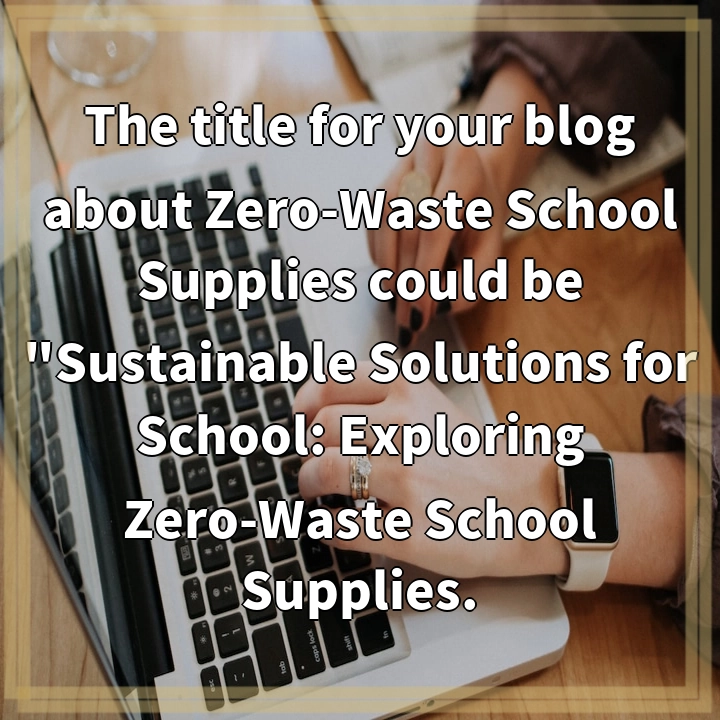
What it is:
Sustainable Solutions for School: Exploring Zero-Waste School Supplies
Zero-waste school supplies refer to a range of eco-friendly products and practices that aim to minimize or eliminate waste in educational settings. These supplies are designed to reduce the environmental impact typically associated with traditional school supplies, which often contribute to plastic pollution, deforestation, and resource depletion.
Real-World Problems:
Plastic Pollution: Traditional school supplies, such as plastic binders, folders, and pens, generate a significant amount of plastic waste. This waste often ends up in landfills or pollutes ecosystems, contributing to global plastic pollution and threatening marine life.
Deforestation: The production of conventional paper-based school supplies leads to deforestation and habitat destruction. Forests are cleared to obtain raw materials like wood pulp, leading to the loss of biodiversity and the release of carbon dioxide into the atmosphere.
Resource Depletion: Many school supplies are made from non-renewable resources like petroleum-based plastics. The extraction and processing of these resources contribute to resource depletion and carbon emissions, exacerbating the negative impacts of climate change.
Waste Generation: Each year, students discard vast amounts of partially used notebooks, pens, and other supplies. This wastefulness results in a significant amount of landfill waste and squanders valuable resources that could have been utilized more sustainably.
Health Impacts: Some conventional school supplies, such as markers and glues, contain toxic chemicals that can be harmful to human health, particularly for children who may be more susceptible to these substances.
By exploring and adopting zero-waste school supplies, we can address these real-world problems and create a more sustainable educational environment that promotes environmental stewardship and student well-being.

Solutions for Zero-Waste School Supplies:
1. Choose Eco-Friendly Materials:
Select school supplies made from sustainable and renewable materials, such as recycled paper, bamboo, or organic cotton. Opt for pens and pencils made from recycled plastic or sustainable wood sources.
2. Embrace Digital Tools:
Minimize paper waste by utilizing digital tools for note-taking, assignments, and communication. Electronic devices like tablets or laptops can reduce the need for printing and allow for efficient organization and storage of materials.
3. Encourage Reuse and Repair:
Promote the reuse of school supplies by encouraging students to repair and repurpose items like backpacks, binders, and art materials. Encourage the adoption of refillable products, such as ink cartridges and highlighters, to reduce single-use waste.
4. Educate and Raise Awareness:
Educate students, parents, and teachers about the environmental impact of conventional school supplies. Create awareness campaigns to promote the use of zero-waste alternatives and engage the school community in sustainable practices.
5. Support Local and Sustainable Brands:
Give preference to local and eco-friendly brands that prioritize sustainability in their production processes. Look for certifications like Forest Stewardship Council (FSC) for paper products or third-party eco-labels for other supplies.
6. Establish Recycling Programs:
Set up recycling stations in schools to collect and properly dispose of materials like paper, cardboard, and plastic. Educate students on proper recycling practices and the importance of recycling to reduce waste sent to landfills.
7. Collaborate with Suppliers:
Engage with school suppliers to advocate for more sustainable options and packaging. Request suppliers to provide zero-waste or minimal packaging alternatives, and support those who prioritize environmentally friendly practices.
By implementing these solutions, schools can significantly reduce their environmental impact, promote sustainability education, and inspire a culture of eco-consciousness among students, teachers, and the wider community.















